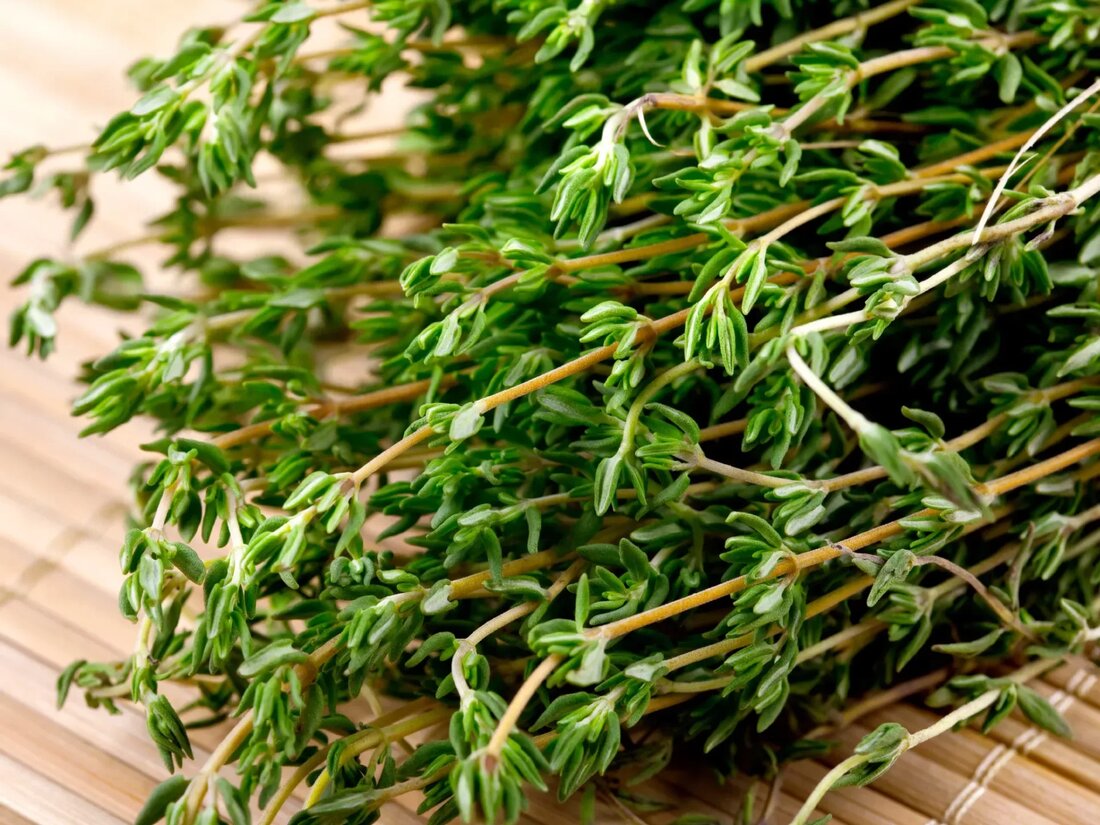Thyme - 10 Powerful Benefits for Your Health & Side Effects
There are few things that a sprig of thyme cannot significantly improve. This versatile herb pairs well with a variety of flavors and is full of health-promoting compounds, vitamins, antioxidants, and other nutrients. Thyme belongs to the genus Thymus, which is part of the mint family and is closely related to oregano – another powerful herb. This perennial herb is native to the southern Mediterranean and is now grown worldwide for its culinary and therapeutic purposes. While this herb will liven up your cooking, thyme can also help remove harmful organisms from your body and support your mental and physical health. What is thyme? Thyme is an evergreen herb that...

Thyme - 10 Powerful Benefits for Your Health & Side Effects
There are few things that a sprig of thyme cannot significantly improve. This versatile herb pairs well with a variety of flavors and is full of health-promoting compounds, vitamins, antioxidants, and other nutrients.
Thyme belongs to the genus thymus, which belongs to the mint family and is closely related to oregano – another powerful herb. This perennial herb is native to the southern Mediterranean and is now grown worldwide for its culinary and therapeutic purposes. While this herb will liven up your cooking, thyme can also help remove harmful organisms from your body and support your mental and physical health.
What is thyme?
Thyme is an evergreen herb that blooms with small white, pink and purple flowers. They hybridize easily and grow quickly in sunny areas with well-drained soil. Thanks to its ease of cultivation and growth, there are over 300 varieties of thyme today. Each variety has unique flavors and uses for cooking, oils, medicine, or decoration. Common thyme (T. vulgaris) and lemon thyme (T. citriodorus) are used in cooking, while Spanish thyme (T. zygis) and creeping thyme (T. serpyllum) are popular in many herbal supplements. (Source)
History of Thyme
People's love and admiration for thyme is nothing new. The recorded history of thyme dates back to ancient Egypt and Rome. The Egyptians used thyme as part of their mummification process, and the Romans ate it before meals and gave it to soldiers as a sign of courage and admiration. In fact, the Latin word for thyme, thymus, means courage and strength. This tradition of giving thyme to soldiers continued in the Middle Ages when people in England began using thyme as a cooking spice. ((link removed))
Nutrients in Thyme
Thyme has remained influential over the years due, among other things, to its health benefits, all of which can be attributed to its diverse profile of vitamins, minerals and other essential nutrients. Thyme is an excellent source of fiber, calcium, iron, manganese and vitamins A, B6 and C. The plant also contains robust phenols – thymol, eugenol and carvacrol.
Here is the nutritional breakdown of one tablespoon of fresh thyme. (Source)
| nutrient | Crowd |
|---|---|
| protein | 0.1g |
| fibre | 0.3g |
| calcium | 10 mg |
| copper | 0.01 mg |
| manganese | 0.04 mg |
| magnesium | 4 mg |
| iron | 0.4 mg |
| phosphorus | 15 mg |
| potassium | 5 mg |
| Riboflavin | 17.7 mg |
| Thiamines | 0.117 mg |
| Riboflavin | 0.01 mg |
| zinc | 0.04 mg |
| Vitamin A | 0.03 mg |
| Vitamin B6 | 0.008 mg |
| Vitamin C | 3.8 mg |
| zinc | 0.04 mg |
Top 10 Health Benefits of Thyme
Here is a list of impressive health benefits confirmed by recent studies and research.
1. Resists harmful organisms
Thyme contains powerful chemical compounds such as thymol and carvacrol, which are resistant to harmful organisms. Studies have shown that thyme promotes mushroom balance. Some studies even show that compounds in thyme and oregano oil are helpful as part of a comprehensive strategy for dealing with some types of organisms that are particularly aggressive. ((Link removed), (Link removed))
Our recommendation: (link removed)
2. Supports respiratory health
Respiratory health is important, especially for those with compromised immune systems. Thyme supports normal respiratory health at any time of the year. Studies show that thyme combined with primrose root soothes your respiratory tract and promotes normal lung health. ((Link removed), (Link removed), (Link removed))
Our recommendation: (link removed)
3. Promotes heart health
Both blood pressure and cholesterol play an important role in heart health. Thyme contains nutrients that support normal blood pressure and cholesterol levels. ((link removed))
Our recommendation: (link removed)
4. Increases well-being
Thyme can help maintain mental well-being. Consuming thyme and oregano oil daily can affect neurotransmitters and improve your mood. A compound found in thyme oil, carvacrol, positively influenced dopamine and serotonin status when consumed over a seven-day period. ((link removed))
Our recommendation: (link removed)
5. Promotes healthy looking skin
For years, nurses wrapped thyme in bandages to help wounds heal. Current studies confirm that thyme can support skin health. One study even found that thyme could help reduce the appearance of wrinkles. ((link removed), source 2)
Our recommendation: (link removed)
6. Natural insect repellent
Thyme is a favorite herb to grow at home. Not only is it convenient for cooking, but it can also help keep your home insect-free. Thyme acts as a natural repellent against mosquitoes and other pests. (Source)
Our recommendation: (link removed)
7. Powerful antioxidant
Thyme is a great source of antioxidants such as apigenin, luteolin, saponins and tannins. These antioxidants help neutralize free radicals before they can cause damage and oxidative stress. Thyme and iron are often taken together to ensure better balance and reduce the occurrence of oxidative stress. (Source 1, Source 2, Source 3)
Our recommendation: (link removed)
8. Relieves occasional coughs and sore throats
Thyme has been used to support seasonal well-being for years. Many studies have confirmed this use and shown that thyme helps your body get over the occasional cough and sore throat. (Source)
Our recommendation: (link removed)
9. Promotes oral health
Thyme, along with other herbs, can support good oral health. Thyme essential oils can protect against harmful organisms that target the mouth and prevent bad breath. (Source 1, Source 2, Source 3)
Our recommendation: (link removed)
10. Food safety and preservation
While thyme is a popular addition to many dishes, it can be used for more than just flavor. Thyme's resistance to harmful organisms has been observed and exploited by major food manufacturers. Thyme essential oil is an effective, natural way to preserve and extend food shelf life. (Source 1, Source 2)
Our recommendation: (link removed)
Thyme side effects
Thyme has no documented side effects. The main concern with using fresh thyme or thyme essential oils is the possibility of an allergic reaction. Aside from known allergies, thyme is considered safe and gentle to eat or use topically.
Adding thyme to your diet
You can grow thyme at home or purchase fresh at most grocery stores and farmers markets. Fresh thyme is perfect for making tinctures, teas, or adding to food. Dried thyme is also found in every spice aisle and is a great way to keep the herb in your home at all times. Thyme essential oils are also a great way to quickly and easily access the benefits of thyme. Not all essential oils are food safe, but thyme essential oils can be used in a diffuser or applied topically.
You can also take thyme therapeutically to reap its many health benefits.
Buy thyme
We were able to classify some products as good and high quality and have linked them here for you.
Thyme as a spice: (link removed)
Thyme as a syrup: (link removed)
Thyme as an essential oil: (link removed)
Thyme as oil: (link removed)
Thyme as a herb & tea: (link removed)

 Suche
Suche
 Mein Konto
Mein Konto
